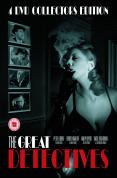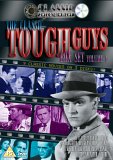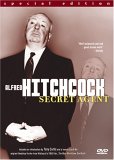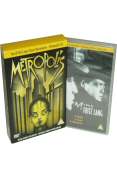 The Great Detectives | DVD | (21/05/2007)
from £N/A
| Saving you £N/A (N/A%)
| RRP
The Great Detectives | DVD | (21/05/2007)
from £N/A
| Saving you £N/A (N/A%)
| RRP Value for money nostalgia box set of four of Hollywoods Golden Detectives - Sherlock Holmes Dick Tracy Mr Moto and Mr Wong. Terror by Night:The legendary Sherlock Holmes plunges us into this thrill ride of a murder mystery set on a speeding passenger train. Holmes has been entrusted to guard the transport of the 400-carat diamond Star of Rhodesia but when the gem is stolen the murders start to mount. Only the masterful Holmes can deduce which of the eccentric and suspicious passengers is the true criminal. Mr Moto's Last Warning:Peter Lorre returns as the clever and cunning international police detective Mr. Moto in this sixth installment of the popular series. Mr. Moto is on assignment in Egypt's Port Said determined to thwart a diabolical conspiracy that would destroy diplomatic relations between England and France and jump start World War II. Mercenary saboteurs led by the paranoid ventriloquist Fabian the Great and the duplicitous Eric Norvel plot to blow up an arriving fleet of French ships. Early on the evil renegades are convinced they've stopped Mr. Moto for good but they've actually murdered an imposter! Demonstrating his mastery of disguise Mr. Moto assumes the identity of a mild-mannered antiques dealer cannily strategizing against the scoundrels' every move. With the assistance of secret agent Richard Burke Mr. Moto employs his singular ingenuity to foil the deadly scheme. The Mystery of Mr Wong:Detective James Lee Wong must find the ""Eye of the Daughter of the Moon "" a priceless but cursed sapphire stolen in China and smuggled to America. His search takes him into the heart of Chinatown and to the dreaded ""House of Hate"" to find the deadly gem before it can kill again. Dick Tracy Meets Gruesome:The world's most beloved comic-strip detective is vividly brought to life by Ralph Byrd in this brutal crime caper that's guaranteed to satisfy viewers with an appetite for action-packed adventure.
![The Man Who Knew Too Much [DVD]](/pictures/1092339.jpg) The Man Who Knew Too Much | DVD | (06/04/2009)
from £16.95
| Saving you £-8.96 (N/A%)
| RRP
The Man Who Knew Too Much | DVD | (06/04/2009)
from £16.95
| Saving you £-8.96 (N/A%)
| RRP The Man Who Knew Too Much is American doctor Ben McKenna. On holiday in Morocco with his wife Jo and his eight-year-old son Hank he inadvertently witnesses a murder in a market and becomes privy to a plot of political assassination. This being masterminded by the Draytons an English couple they have met in a restaurant and is due to take place in London in a few days' time. In order to prevent McKenna from going to the police the couple kidnap Hank. Ben is warned not to tell the police what he knows. Hank's life depends on his silence.
 Crosby Lamour - Hope | DVD | (23/04/2007)
from £33.73
| Saving you £-1.74 (N/A%)
| RRP
Crosby Lamour - Hope | DVD | (23/04/2007)
from £33.73
| Saving you £-1.74 (N/A%)
| RRP Includes The Films: My Favourite Brunette The Road To Bali The Road To Hollywood
 Classic Tough Guys | DVD | (01/08/2006)
from £N/A
| Saving you £N/A (N/A%)
| RRP
Classic Tough Guys | DVD | (01/08/2006)
from £N/A
| Saving you £N/A (N/A%)
| RRP Call It Murder (Dir. Chester Erskine 1934) This is the story of a jury foreman whose vote sends a young woman to the electric chair for a murder she committed. His beliefs are tested when his own daughter goes on trial for a similar murder. Great Guy (Dir. John G. Blystone 1937): Ex-prize-fighter Johnny Cave (Cagney) Is knocked into the position of chief deputy of weights and measures after the current chief is hospitalized by an apparent assassination attempt. After only minutes on the job Cave goes several rounds with a ring of light-weight chiselers who have mastered the art of defrauding shoppers. Cave's aggressive political tactics make him the next likely target on the underworld's hit list. The Lucky Texan (Dir. Robert Bradbury 1934): John Wayne and his sidekick 'Gabby"" Hayes are gold miners who strike it rich. Unfortunately before they can enjoy the fruits of their labor they are wrongfully accused of robbery and murder. As always the road to the truth is never a straight path. Vengeance Valley (Dir. Richard Thorpe 1951): For his entire life Owen has been covering up for his good-for-nothing brother Lee protecting the rascal from their father's wrath. Finally however Lee's shenanigans go too far. After getting a young woman pregnant Lee shifts the blame to Owen. Lee even encourages the girl's brothers to get revenge hoping that with Owen out of the picture he'll become the sole heir to their father's farm. That's as much as any man can take...and Owen decides that it's time to settle the score. The Big Trees (Dir. Felix Feist 1952): A peaceful Quaker colony is thrown into turmoil by the arrival of a fast-talking lumber man. A new law will enable his company to harvest millions of dollars from the majestic redwood forests if the locals will let him. The community refuses to see their beloved sequoias wiped out and pleads with the greedy businessman to halt the destruction. As their clash of ideas rages on an even greater threat to the trees emerges. The Man From Utah (Dir. Robert N. Bradbury 1934): This John Wayne classic brings us to the rodeo. John Weston ('the Duke') has to deal with the corrupt patron who has killed some of the rodeo's performers and who fixes the competition to guarantee Weston to lose. Gangster Story (Dir. Walter Matthau 1960): Matthau plays mob leader Jack Martin whose girlfriend Carol (Grace) is desperate for him to give up his unlawful and dishonest lifestyle. The problem is Jack doesn't have the same yearning to turn his back on his shady past but the crunch comes when he persuades the bank manager to lease him an office in the building and promptly robs the bank! With events turning very nasty is there any point in Carol trying to save her man from himself when all the signs indicate that he's hell bent on a course to self-destruction. Beat The Devil (Dir. John Huston 1953): a wacky comedy that's played as straight as any film noir and is even funnier as a result. Five men (Bogart Lorre Morley Barnard and Tulli) are out to garner control over East African land which they believe contains a rich uranium ore lode. Billy Dannreuther (Bogart) is married to Maria (Gina Lollobrigida) the other four are their ""business associates"" and Jones and Underdown are added to the mix for some interesting diversification. As the boat leaves from Italy to Africa a hodge-podge of amusingly silly adventures begins. British Intelligence (Dir. William Nigh 1940): They say that Karloff preferred character parts and in British Intelligence he's Valdar a sabrescarred butler who might be a secret agent.
![My Favourite Brunette [DVD]](/pictures/1094594.jpg) My Favourite Brunette | DVD | (13/07/2009)
from £10.78
| Saving you £-2.79 (-34.90%)
| RRP
My Favourite Brunette | DVD | (13/07/2009)
from £10.78
| Saving you £-2.79 (-34.90%)
| RRP Legendary funnyman Bob Hope plays a baby photographer who gets mixed up with gangsters in this bubbly slapstick comedy-drama. Ronnie Jackson (Hope) wants nothing more than to step into the gumshoes of office mate Sam McCloud (film noir veteran Alan Ladd) a private investigator who runs his own detective agency. Jackson gets his big break when a mysterious femme fatale (Dorothy Lamour) strolls into his office and mistaking him for McCloud asks for help with her uncle's kidnapping. Jackson plays along with the detective role but is soon in way over his head as he becomes embroiled in a dangerous (and comic!) mystery. This spoof of the hardboiled detective genre also features horror legends Peter Lorre and Lon Chaney as Hope's villainous foils.
![My Favourite Brunette [1947]](/pictures/1049878.jpg) My Favourite Brunette | DVD | (30/10/2006)
from £10.78
| Saving you £-2.79 (-34.90%)
| RRP
My Favourite Brunette | DVD | (30/10/2006)
from £10.78
| Saving you £-2.79 (-34.90%)
| RRP Bumbling baby photographer Ronnie Jackson gets mistaken for a private detective and hired to find the missing Baron by Baroness Carlotta Montay. This is not a straight forward assignment however and Jackson soon finds himself involved in a murder and pursued by gangsters....
![Quicksand [DVD] [1950]](/pictures/1094919.jpg) Quicksand | DVD | (21/09/2009)
from £10.78
| Saving you £-2.79 (-34.90%)
| RRP
Quicksand | DVD | (21/09/2009)
from £10.78
| Saving you £-2.79 (-34.90%)
| RRP Quicksand
![Casablanca -- Two-disc Special Edition [1942]](/pictures/1012064.jpg) Casablanca -- Two-disc Special Edition | DVD | (09/02/2004)
from £N/A
| Saving you £N/A (N/A%)
| RRP
Casablanca -- Two-disc Special Edition | DVD | (09/02/2004)
from £N/A
| Saving you £N/A (N/A%)
| RRP World War II Morocco springs to life in Michael Curtiz's classic love story. Colourful characters abound in "Casablanca", a waiting room for Europeans trying to escape Hitler's war-torn Europe.
![Beat The Devil [1953]](/pictures/1012155.jpg) Beat The Devil | DVD | (17/11/2003)
from £N/A
| Saving you £N/A (N/A%)
| RRP
Beat The Devil | DVD | (17/11/2003)
from £N/A
| Saving you £N/A (N/A%)
| RRP ![Beat the Devil [DVD]](/pictures/1122519.jpg) Beat the Devil | DVD | (04/08/2014)
from £9.43
| Saving you £N/A (N/A%)
| RRP
Beat the Devil | DVD | (04/08/2014)
from £9.43
| Saving you £N/A (N/A%)
| RRP  Bob Hope Collection | DVD | (15/03/2004)
from £N/A
| Saving you £N/A (N/A%)
| RRP
Bob Hope Collection | DVD | (15/03/2004)
from £N/A
| Saving you £N/A (N/A%)
| RRP The Bob Hope collection contains some of the greatest works from the comic genius that is Bob Hope. Entertaining audiences during his long career & working alongside some of the greatest stars in the industry Bob Hope has stamped his mark in history. Tiitles Include: * My Favourite Brunette * Road To Rio * Road To Bali * The Bob Hope Story * Cat And The Canary
 Man Who Knew Too Much | DVD | (24/07/1999)
from £N/A
| Saving you £N/A (N/A%)
| RRP
Man Who Knew Too Much | DVD | (24/07/1999)
from £N/A
| Saving you £N/A (N/A%)
| RRP Alfred Hitchcock himself called this 1934 British edition of his famous kidnapping story "the work of a talented amateur", while his 1956 Hollywood remake was the consummate act of a professional director. Be that as it may, this earlier movie still has its intense admirers who prefer it over the Jimmy Stewart--Doris Day version, and for some sound reasons. Tighter, wittier, more visually outrageous (back-screen projections of Swiss mountains, a whirly-facsimile of a fainting spell), the film even has a female protagonist (Edna Best in the mom part) unafraid to go after the bad guys herself with a gun. (Did Doris Day do that that? Uh-uh.) While the 1956 film has an intriguing undercurrent of unspoken tensions in nuclear family politics, the 1934 original has a crisp air of British optimism glummed up a bit when a married couple (Best and Leslie Banks) witness the murder of a spy and discover their daughter stolen away by the culprits. The chase leads to London and ultimately to the site of one of Hitch's most extraordinary pieces of suspense (though on this count, it must be said, the later version is superior). Take away distracting comparisons to the remake, and this Man Who Knew Too Much is a milestone in Hitchcock's early career. Peter Lorre makes his British debut as a scarred, scary villain. --Tom Keogh
 Secret Agent | DVD | (24/07/1999)
from £N/A
| Saving you £N/A (N/A%)
| RRP
Secret Agent | DVD | (24/07/1999)
from £N/A
| Saving you £N/A (N/A%)
| RRP One of Alfred Hitchcock's finest pre-Hollywood films, the 1936 Secret Agent stars a young John Gielgud as a British spy whose death is faked by his intelligence superiors. Reinvented with a new identity and outfitted with a wife (Madeleine Carroll), Gielgud's character is sent on assignment with a cold-blooded accomplice (Peter Lorre) to assassinate a German agent. En route, the counterfeit couple keeps company with an affable American (Robert Young), who turns out to be more than he seems after the wrong man is murdered by Gielgud and Lorre. Dense with interwoven ideas about false names and real identities, about appearances as lies and the brutality of the hidden, and about the complicity of those who watch the anarchy that others do, Secret Agent declared that Alfred Hitchcock was well along the road to mastery as a filmmaker and, more importantly, knew what it was he wanted to say for the rest of his career. --Tom Keogh
![My Favourite Brunette - Bob Hope 100th Anniversary [1947]](/pictures/1008629.jpg) My Favourite Brunette - Bob Hope 100th Anniversary | DVD | (06/10/2003)
from £8.98
| Saving you £-2.99 (N/A%)
| RRP
My Favourite Brunette - Bob Hope 100th Anniversary | DVD | (06/10/2003)
from £8.98
| Saving you £-2.99 (N/A%)
| RRP  Metropolis/M - Ultimate Box | DVD | (22/11/2003)
from £N/A
| Saving you £N/A (N/A%)
| RRP
Metropolis/M - Ultimate Box | DVD | (22/11/2003)
from £N/A
| Saving you £N/A (N/A%)
| RRP Metropolis: Set around the year 2000 a mammoth city is ruled by the super-efficient industrialist Jon Fredersen (Alfred Abel) and on the surface appears to be a utopian dream with wealthy inhabitants living in palatial apartments set in colossal glass and concrete spires. But underground it's a different story - armies of slaves work gruelling shifts to maintain the luxurious lifestyles of their masters. The workers a subhuman species of sluggish creatures are led by the saintly Maria (Brigitte Helm) who urges them not to rebel but to wait patiently for the arrival of the mediator. Fredersen kidnaps Maria and orders mad scientist Rotwang (Rudolf Klien-Rogge) to create a robot replica to take her place. His plan is doomed when the evil mechanical Maria incites the massed workers to revolt and destroy everything in sight... Taking 16 months to film with a cast of 37 383 and costing over million at 1920s prices everything about this epic German science-fiction film which was inspired by the towering Manhattan skyline is gigantic. Although director Fritz Lang hated the ending of his film it was an instant hit with Adolf Hitler and Goebbels who first saw it in a small German town. When they came to power in 1933 they asked Lang to make prestige pictures for the Nazi party. He packed his bags and left for Hollywood the same day. On its first release it was a box-office flop and nearly bankrupted its financiers UFA Germany's largest film production company. Metropolis is now a monument to Fritz Lang's artistic vision and film craftsmanship. M: Like a brand the letter M has made its mark on film history with its disturbing theme having lost none of its impact or relevance. Sinister dark and foreboding M tells the story of Hans Beckert (Peter Lorre) - child molester and murderer. Tension builds - a child late home another child missing. Posters reveal the fate of earlier victims and the police seem to have few clues as to the perpetrator of the crimes. Gangsters beggars and petty criminals incensed by both the crimes and the police crackdown track the killer themselves. Cornered caught and dragged off to face an equally barbaric form of justice Beckert endures his own personal torment. As with his earlier classics Die Nibelungen and Metropolis Lang collaborated on the script with his wife Thea von Harbou in what was to become his most stark and uncompromising film. Allegedly based on the story of Peter K''rten the Monster of Dusseldorf M remains one of the most chilling serial-killer films ever produced.
![Casablanca (2 Disc Special Edition) [1942]](/pictures/1047141.jpg) Casablanca (2 Disc Special Edition) | DVD | (07/08/2006)
from £19.15
| Saving you £-6.16 (N/A%)
| RRP
Casablanca (2 Disc Special Edition) | DVD | (07/08/2006)
from £19.15
| Saving you £-6.16 (N/A%)
| RRP World War II Morocco springs to life in Michael Curtiz's classic love story. Colourful characters abound in "Casablanca", a waiting room for Europeans trying to escape Hitler's war-torn Europe.
![My Favourite Brunette [1947]](/pictures/1012184.jpg) My Favourite Brunette | DVD | (27/10/2003)
from £12.91
| Saving you £-6.92 (N/A%)
| RRP
My Favourite Brunette | DVD | (27/10/2003)
from £12.91
| Saving you £-6.92 (N/A%)
| RRP Ronnie Jackson is a baby photographer with aspirations for more exciting work. He is studying to be a detective like the guy in the office next door. Mistakenly hired by Baroness Carlotta Montay to track down the Baron who's been kidnapped and to protect a highly prized map Ronnie tangles with crooks and winds up on death row.
![My Favourite Brunette [1947]](/pictures/1012775.jpg) My Favourite Brunette | DVD | (01/07/2002)
from £9.96
| Saving you £10.02 (143.76%)
| RRP
My Favourite Brunette | DVD | (01/07/2002)
from £9.96
| Saving you £10.02 (143.76%)
| RRP In My Favorite Brunette we witness Bob Hope's own unique brand of film comedy as he teams up with the great screen beauty Dorothy Lamour (who later co-starred with him in many of the classic Road To... movies along with Bing Crosby). Co-starring Peter Lorre and Lon Chaney Jr. Hope romps through this yarn playing a bumbling photographer turned private eye and finds himself involved with a spy caper the mob and a dangerous brunette.
![Beat the Devil/Humphrey Bogart on Film [Special Edition] [1953]](/pictures/1010411.jpg) Beat the Devil/Humphrey Bogart on Film | DVD | (23/11/1999)
from £N/A
| Saving you £N/A (N/A%)
| RRP
Beat the Devil/Humphrey Bogart on Film | DVD | (23/11/1999)
from £N/A
| Saving you £N/A (N/A%)
| RRP ![The Man Who Knew Too Much [1934]](/pictures/1011871.jpg) The Man Who Knew Too Much | DVD | (24/05/2004)
from £8.38
| Saving you £-2.39 (-39.90%)
| RRP
The Man Who Knew Too Much | DVD | (24/05/2004)
from £8.38
| Saving you £-2.39 (-39.90%)
| RRP Alfred Hitchcock himself called this 1934 British edition of his famous kidnapping story "the work of a talented amateur", while his 1956 Hollywood remake was the consummate act of a professional director. Be that as it may, this earlier movie still has its intense admirers who prefer it over the Jimmy Stewart--Doris Day version, and for some sound reasons. Tighter, wittier, more visually outrageous (back-screen projections of Swiss mountains, a whirly-facsimile of a fainting spell), the film even has a female protagonist (Edna Best in the mom part) unafraid to go after the bad guys herself with a gun. (Did Doris Day do that that? Uh-uh.) While the 1956 film has an intriguing undercurrent of unspoken tensions in nuclear family politics, the 1934 original has a crisp air of British optimism glummed up a bit when a married couple (Best and Leslie Banks) witness the murder of a spy and discover their daughter stolen away by the culprits. The chase leads to London and ultimately to the site of one of Hitch's most extraordinary pieces of suspense (though on this count, it must be said, the later version is superior). Take away distracting comparisons to the remake, and this Man Who Knew Too Much is a milestone in Hitchcock's early career. Peter Lorre makes his British debut as a scarred, scary villain. --Tom Keogh

Please wait. Loading...
This site uses cookies.
More details in our privacy policy